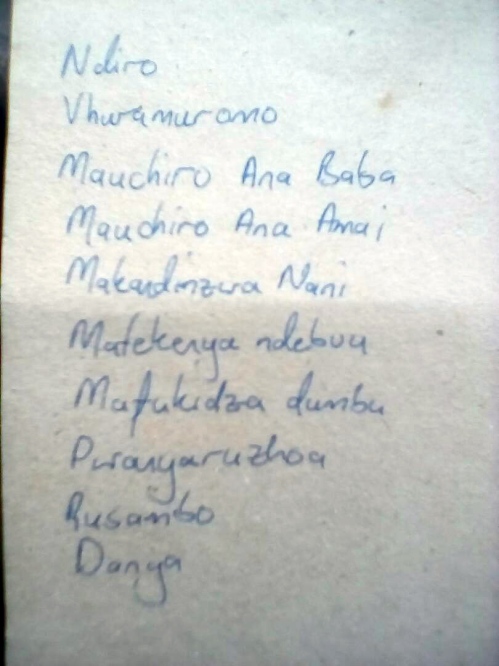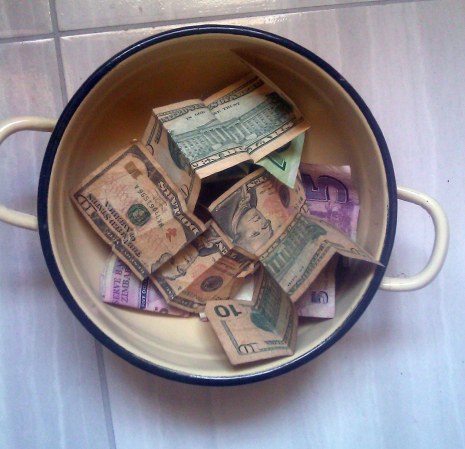Marriage has always been the ultimate commitment to any relationship, sometimes unspoken even downright ignored but it’s always there lurking…………..

In the Zimbabwean culture, the aunts Vatete (your father’s sisters) and their children (vazukuru) are the pillars of a family, they mediate and interpret the wills and wishes of the fathers and uncles….
There is a Shona saying:
Muzukuru mudonzvo
Meaning the nephew is an uncle’s walking stick.
When you plan to get married and also honour the traditional way, you first inform your aunt and she helps break it to your family and father(s) that you are now grown up and wish to marry. You contact the aunts of your fiancée’s family and they consult with their family and a date is set up when the in-laws can come to be seen, to ask for the daughter’s hand in marriage and pay the bride price (roora/lobola)
It’s a big to do, the day the in-laws come, marooro, the whole family gathers. A lot of cooking goes down and some will miss out (usually the daughters-in-law) as they will be stuck behind the scenes cutting vegetables, cooking and cleaning making sure everything is perfect….
When everyone is assembled and ready a message is sent out to the suitors that they can send in their go-between/mediator (munyayi). Sometimes the aunts can help you arrange for a mediator who understands the fathers to help swing things in your favour as cultural differences can cause misunderstandings, before the formalities are done one cannot be directly address wife’s uncles, hence the need for a go-between.
The mediators arrives and the fun begins.
First the mediator cannot sit on the sofas, even if invited to do so must decline politely and sit on the floor. The lobola (bride price) negotiation ceremony is delicate balance between a very somber affair and a light hearted occasion, and the mediator must walk this fine line navigating through the proposed figures and what they are willing to pay/afford to pay. Sometimes these talks have been known to break down so irrevocably that they get cancelled and the suitors are told to come back better prepared or when they are more serious….
Generally a list such as the one below will be presented with the proposed figures and the mediator takes the list to back to agree with the suitors and item by item they make a counter offer. The mediator will do a lot of back and forth as the suitors will be waiting a distance away or at a family friend’s house.

Ndiro –is money for the plate the money will be put into, and no you wont get a discount even if you bring your own plate.

Vhuramuromo – which translates to Open Mouth is money so that the uncles can start talking otherwise they stay quiet even if you greet them. #FunFact A bribe is known as vharamuromo meaning close mouth (hush money)
Mauchiro ana baba – Round of applause to welcome and greet the fathers
Mauchiro ana mai – Round of applause to welcome and greet the mothers
Makandinzwa nani – how did you hear about us? That we had a beautiful daughter
Matekenya ndebvu – Tickling beard for the times growing up the daughter was playing with her father’s beard
Mafukudza dumbu – For the mother, for indignities suffered during child birth
Pwanyaruzhoa – fence breaking, this is a charge for the times their daughter snuck out of the house to come see you.
Rusambo– the actual bride price
Danga- the cows which can be delivered as actual cows or a cash representation
All of these items on the list are paid for with individual sums ranging from $1 to even an outrageous $20 000 depending with families.
No one is ever supposed to pay the whole amount and it’s a bit of scandal when suitor pays everything down to last cent, they say you are showing off, that you are trying to buy their daughter and take her far away and have no reason to ever come back and also be unaccountable should you harm or abuse your wife.
The change you leave behind that debt which you promise to finish is never really paid it’s a way for one to come back and meet the family and say I have brought a little of that amount that I never finished, also for the family to be able to ask favours of you. The elders say one takes better care of something you are still paying for. There is a Shona saying:
“Mukwasha muonde haapere kudyiwa”
Translation the son-in-law is a fruit tree one never stops eating from.
When the mediator is done with these formalities and payment negotiations finally the suitors are ushered into the house and welcomed and introduced into the family Kupinda mumusha.
Now they greet with their father in laws and they are now family.
If the are plans of a church wedding, this is when you inform and make a request of your intentions……
It seems easy enough, but it is all quite an emotionally taxing event, tempers will get tested, nerves will be frayed it seems like the negotiations go on for ever…….
What has your experience at such an event been like I am curious any different items on The Lobola list
~B
day 11 blog everyday challenge

Your thoughts.. if you will?